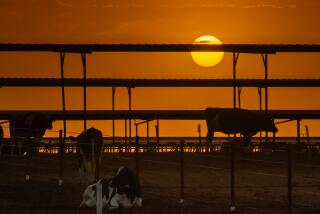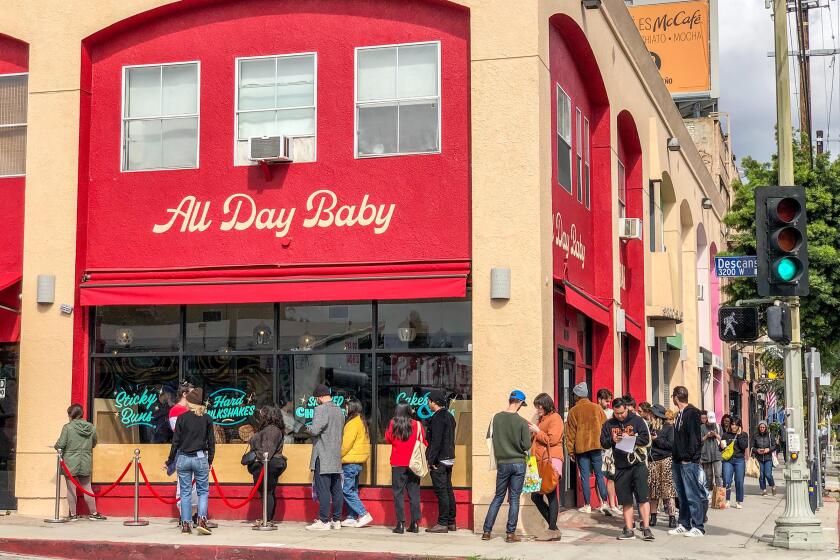Listeriosis Outbreak, Jalisco Closing Create Void : Scramble in Soft-Cheese Market
“In the marketplace, it’s the survival of the fittest.”
That’s how a California cheese industry official views an attempt by one of Wisconsin’s biggest cheese makers--Arpin Dairy--to move into Southern California’s Mexican-style cheese market, where sales are suffering from a listeriosis epidemic.
That also is a fitting assessment for a relatively small Los Angeles-area firm opening its doors for the first time this month so that it, too, can compete in the soft-cheese market.
With the market effects of the outbreak still lingering, the company’s timing was not exactly exquisite, noted David C. Lopez, vice president of sales and marketing for Rodeo Industries Inc., City of Industry.
“We didn’t expect all this” when Rodeo investors earlier this year pooled $1 million to gain a foothold in the Mexican-style cheese market, he said.
Two major Mexican-style cheese producers had dominated Los Angeles-area sales in recent years.
One of them, Jalisco Mexican Products Inc. of Artesia, shut down in mid-June following the discovery by state and federal officials of potentially deadly bacteria, Listeria monocytogenes , in some of its cheese products. The bacteria has killed 84 people in California, half of them in the Los Angeles area. Last Friday, the company said the closing would be permanent.
Jalisco’s major competitor, Cacique Cheese Co. of the City of Industry, voluntarily stopped pro duction during most of July while government inspectors combed through its new plant after discovering what turned out to be a harmless strain of Listeria bacteria in a batch of cheese. Cacique was given a clean bill of health and reopened last Friday.
The shutdowns at these two companies, accompanied by product recalls in California and other states, left consumers, primarily Latinos, with few other producers to turn to for the popular soft cheese. Only a handful of plants process it in California.
“That was an opportunity,” said David Meyer, vice president of Arpin Dairy, one of the biggest cheese producers in Wisconsin, which, along with California, leads the nation in cheese production. “We could see it immediately. We’ve tried to enter that market before, but Jalisco and Cacique had very strong brand loyalty.”
The firm, based in the small central Wisconsin town of Arpin, already markets a fresh, white Mexican-style cheese in New York and Florida and several other lines of cheese products in California.
Could Arpin be viewed as a giant dairy trying to muscle into territory during hard times for the Mexican-style cheese industry here?
No, Meyer said in a telephone interview. “There’s an opportunity to fill a void if the product still has demand.”
This was a reference to the sharp drop in sales of Mexican-style cheese in the Los Angeles area following the listeriosis outbreak.
John Silva, who owns a delicatessen in the Grand Central Public Market in downtown Los Angeles, said he anticipated “a lot of little (Mexican-style) cheese companies springing up” following the Jalisco shutdown. The Jalisco closing, he said, “leaves it wide open” for aspiring entrepreneurs to attempt to increase deliveries or break into the large Latino market here.
To illustrate his point, Silva pointed to a delivery he received Monday from a small San Jose cheese maker, Marquez Bros. “It’s the Mexican food,” he said. “It’ll come back, no doubt about it.”
Gilbert de Cardenas, the Cacique chief executive, was not as optimistic as Silva. He said it could take up to “two months” before Latino consumers begin buying his firm’s products in any significant quantity.
“There’s going to be some hesitation,” he said in a telephone interview Monday, the first day that Cacique resumed distribution following the plant’s voluntary shutdown for most of July.
Still, de Cardenas said, he had reason to be optimistic since his firm had been in the soft-cheese business for 12 years and, therefore, had established distribution. “After this nightmare, (retail outlets) really came through and began placing orders,” he said.
When it is fully calculated, de Cardenas said that Cacique may lose “very close to $1 million” from the temporary plant closing and product recalls in California and other states. Cacique had projected sales of between $13 million and $14 million in 1985.
Bob Sheldon, an official with the Modesto-based California Milk Advisory Board, representing the state’s cheese industry, had no criticism for the timing of Arpin’s decision. In fact, he said, the move will be good for the state’s cheese industry.
“It’s the survival of the fittest,” said Sheldon in a telephone interview. “I have great faith in the California cheese maker. We’ll challenge (Arpin) in the marketplace and let the consumer decide.”
As for the smaller Rodeo firm, sales executive Lopez said the company had no choice but to open during the epidemic because it already had $20,000 worth of cheese in its cooler and had to try to sell it.
He said Rodeo, located just a few miles from the Cacique plant and headed by Newport Beach investor Nicolas Trabolsi, is producing four Mexican-style cheese brands.
“We’ll try and get credibility back in the eyes of the public with a very good product that is fresh, wholesome and pasteurized,” Lopez said.
More to Read
Eat your way across L.A.
Get our weekly Tasting Notes newsletter for reviews, news and more.
You may occasionally receive promotional content from the Los Angeles Times.










